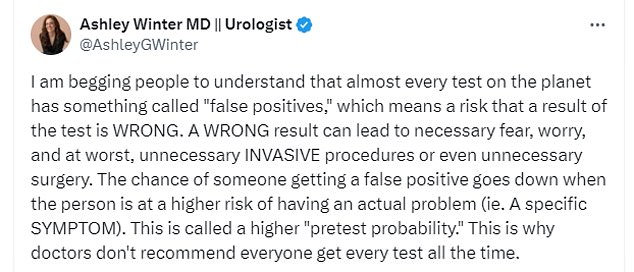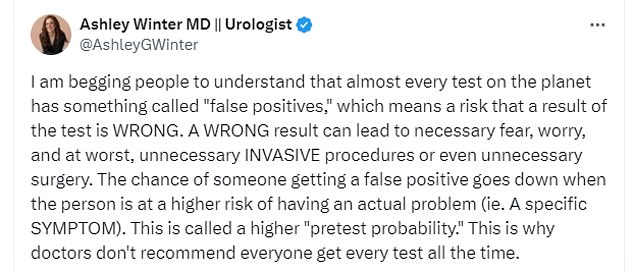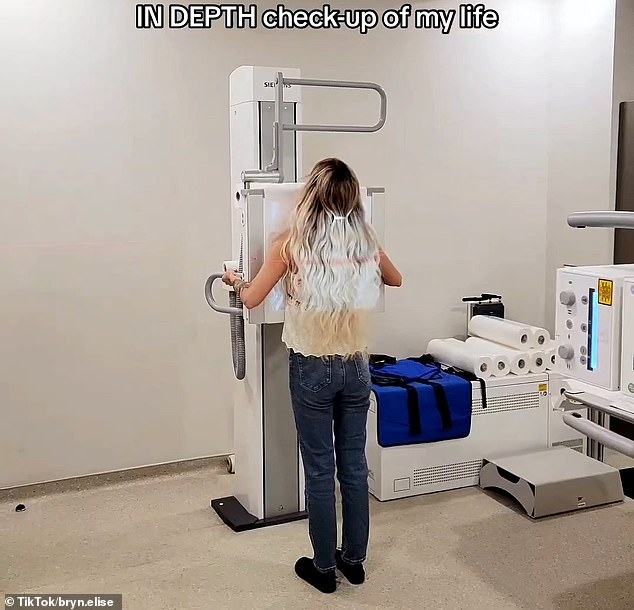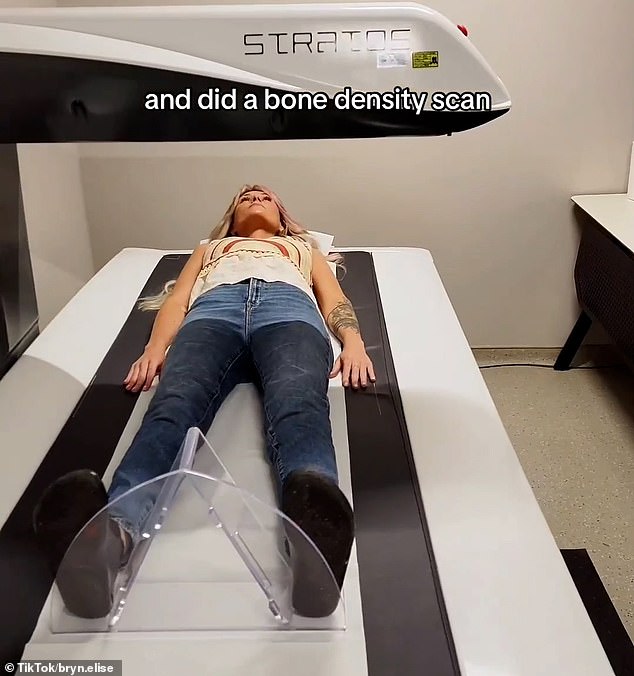Doctors warn of rise of ‘diagnostic tourism’, influencer calls Turkish clinic with 30 full body exams that detect cancer, heart, eye and even gynecological conditions ‘the best there is’





Doctors have raised concerns over a TikTok in which an American influencer undergoes a full MOT in Turkey for £640, claiming it can detect a range of conditions.
The eye-catching video, created by health and beauty tourism influencer Bryn Elise, has already been viewed almost 12 million times and shows her undergoing a “VIP check-up” at Istanbul’s Memorial Hospital.
However, doctors immediately warned on social media about the possible risks.
They warned of the risk of “false positive” results from such tests, which could lead to people undergoing unnecessarily risky, invasive follow-up tests and surgeries.
The clip shows Mrs Elise being shown around the ‘posh’ private hospital and undergoing a series of checks, including a blood test, an electrocardiogram (a type of heart test), a blood pressure test, a chest x-ray, an abdominal and thyroid ultrasound and a bone density scan.

Dr. Ashley Winter, a urologist in Los Angeles, was among the doctors who criticized the video. He said people should be aware that any medical test carries the risk of “false positive results,” which are false indications that something is wrong, which can lead to unnecessary and even risky surgeries.

Bryn Elise had a host of tests and scans included in her VIP package, including a chest x-ray

The 29-year-old influencer also had a bone density scan performed in a high-tech machine

The clip, which has been viewed almost 12 million times, shows Ms Elise undergoing a heart ‘stress test’, where the organ is monitored while she runs on a treadmill.
Accompanied by a personal interpreter, she also underwent an eye test, a gynecological examination, a heart scan and a stress test, and dined at the hospital’s luxury restaurant.
She said a check-up cost a “staggering” $810 (£640), which even with the $700 (£550) flights was thousands of dollars cheaper than a similar treatment in the US. She added that it was “the best thing I’ve ever done for my health”.
Ms Elise, in her late 20s and originally from Colorado, says in her video: ‘If I had done this in the US, it would have cost me thousands of dollars and I would have had to wait in line for months.’
‘But in one day we do it all: scans, tests, meetings with specialists. And the price of everything is staggering.’
She did not give details about why she was undergoing the tests, saying only that she had a “list of mysterious ailments.”
Although the clip shows Ms. Elise discussing her results with an internist, she did not reveal the results, adding that this would be the subject of a “follow-up video.”
She did admit that the eye test had shown she had astigmatism, a common abnormality in the shape of the eye that is usually corrected by wearing glasses or contact lenses.
However, British and American experts who commented on the videos were less impressed with the results.
Responding to the video, Dr. Ashley Winter, a urologist in Los Angeles, said people should be aware that with any medical test there is a risk of “false positive results,” meaning that something is wrong.
In an article on X she explains: ‘A wrong result can lead to necessary fear, worry and in the worst case, unnecessary invasive procedures or even unnecessary surgery.
‘The chance that someone will get a false positive result decreases if the chance that the person actually has a problem (for example, a specific symptom) is greater.’
“This is called a higher ‘pre-test probability’. That’s why doctors don’t recommend everyone to always have all the tests done.”
She illustrated this point with an example from her field of expertise and tests for prostate cancer.
“If I order a PSA (prostate-specific antigen) blood test for a random 85-year-old with no symptoms, I’m likely to get a high result, leading to anxiety, a possible biopsy (which carries the risk of sepsis), and then a possible diagnosis of an intermediate-risk prostate cancer that is unlikely to kill him even if left completely untreated,” she wrote.
She continued: ‘Perhaps the patient is then presented with every possible treatment and, despite the doctor’s advice to observe/monitor him, he is understandably afraid and starts treatment with radiation and hormone suppression.’
‘The hormone suppression causes fatigue, hot flashes, erectile dysfunction, night sweats. The radiation leads to blood in the urine and urge incontinence. He ends up in the emergency room and has an emergency procedure to stop the bleeding.
‘He goes home with a big urinary catheter in his urethra. He feels worthless. He gets sepsis from a urinary tract infection he got from the catheter and dies.
‘And all because he was 85 years old and someone just did the wrong screening test.’
Dr. Winter concluded her presentation by stating that she has seen such patients and that any screening test for diseases and health conditions carries similar risks.
“When doctors say they don’t recommend that everyone get every test, it’s because we’re thinking about these kinds of situations,” she said.
While some doctors questioned whether the video was an advertisement for Memorial Hospital, Elise told MailOnline the clip was not sponsored and she received no commission from it.
She added that the only special treatment she received at the hospital was that she was allowed to film.
Memorial Hospital itself offers a number of so-called “VIP packages,” the contents of which vary. Some are specifically designed for men or women, or some are focused on tracking the risks of certain diseases, such as cancer.
The price isn’t listed on the website, but the description encourages people to purchase one annually.
‘A check-up at least once a year is important for early diagnosis of possible diseases,’ it says.
Preventive health checks are not uncommon in medicine. Some, such as blood pressure tests, are so easy and noninvasive that they can be performed routinely with little to no risk.
With other forms of cancer, the chance of complications is actually very small, such as with scans that use X-rays. It is estimated that the chance of cancer with these scans is less than one in a million.
But as Dr. Winter discusses, there is another danger: False-positive results can lead to a series of follow-up procedures, each carrying additional risks.
This is partly why some tests or scans are only recommended if patients have certain symptoms, if they get worrying results from another test such as a blood test, or if they are in a certain patient group at risk for a particular disease or condition.
One example of this is bowel cancer screening. The NHS sends free kits every two years to people in England aged 60 to 74, as this age group is at higher risk of the disease. There are plans to offer the screening to younger Britons soon.
The influencer has made similar videos before, documenting herself travelling to Thailand to get a $92 (£72) dental repair, or even heading to Turkey to get hair extensions for a fraction of the price it would cost in the US.




